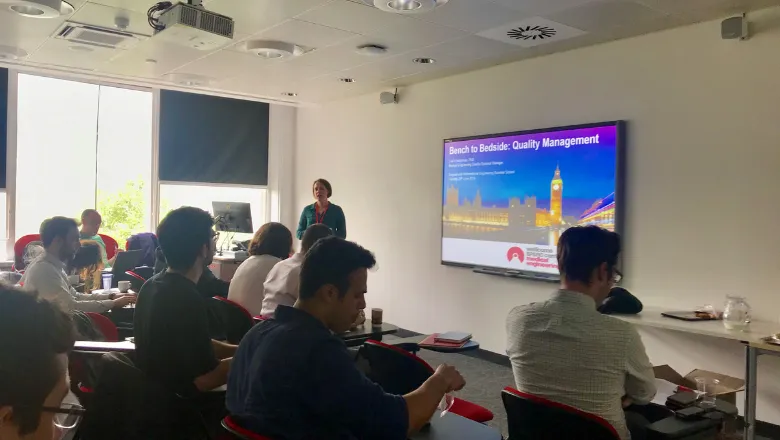I want them [students] to be able to think about how they can separate their problem into solvable subproblems, and how to factor in the clinical requirements early in the design process.
Dr Christos Bergeles, Senior Lecturer in Robotics
01 July 2019
Summer School opens door to 'operating theatre of the future'
The School of Biomedical Engineering & Imaging Sciences hosted a Summer School to train post-graduate research students and professionals on technical and clinical advances in surgical and interventional engineering.

Surgical and Interventional Engineering (SIE) is an integral part of achieving cognitive sensor-guided robotic-assisted surgery. SIE research aims to optimise surgery and intervention for timely, personalised and cost-effective therapies in the ‘operating theatre of the future’.
The SIE Summer School presented a holistic outline of the School’s vision for the development of algorithms and devices, and a set of outstanding seminars from renown national and international speakers, always keeping in mind the path to clinical translation.
Featuring a series of lectures, demonstrations, workshops on medical device development and mini projects, students familiarised themselves with the process of engineering innovation in surgery and intervention. It also included a 5-day activity on the process of ideation, prototyping and commercialisation of medical technology along the principles of frugal innovation.
Led by Dr Christos Bergeles, Senior Lecturer in Robotics, and Tom Vercauteren, Professor of Interventional Image Computing, participants gained a global perspective in SIE with special guests presenting from Vanderbilt University (USA), Queen’s University (Canada), University College London (UK) and Imperial College London (UK).
Dr Bergeles spoke about the emergence of flexible microsurgical robots and highlighted the challenges participants must tackle if they want to create instrumentation for specific clinical applications.
Dr Bergeles encouraged students embarking on a career in SIE to have a solid clinical application in mind when starting their research and work closely not only with their respective engineering supervisors but also with the clinical collaborators.
Associate Professor Dean Barratt, University College London, shared his journey from concept to commercialisation, discussing his precision prostate targeting software SmartTarget. During the event, Professor Brian Davies, a pioneer of robotic surgery from Imperial College also shared insights from 30 years of activity in the field.
PhD student Jeremy Birch, Department of Surgical and Interventional Engineering, one of the SIE Summer School participants stated that for him the event was an opportunity to hear from a unique spread of speakers and find out about the latest research undertaken across image-guided surgical interventions and other biomedical/robotics disciplines.
Ultimately, we want our research to be used in the real world, and these series of talks and workshops make the attendees aware of the steps required to do so and provides them with tools to aid in innovative design.
Jeremy Birch, Department of Surgical and Interventional Engineering
Jeremy recommended others to join next year: “Not only is it a great platform to learn about the newest cutting-edge research but also it provides a series of great workshops on the biomedical design innovation process – how to bring our research from bench to bedside.”
Learn more about the Department of Surgical & Interventional Engineering at King’s here.
